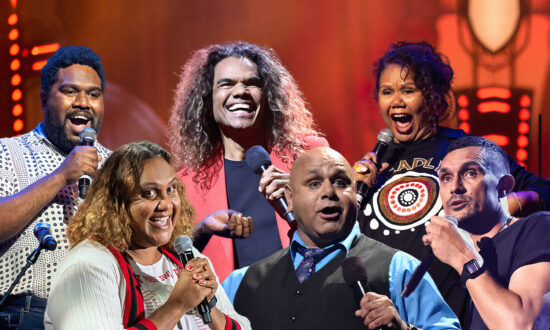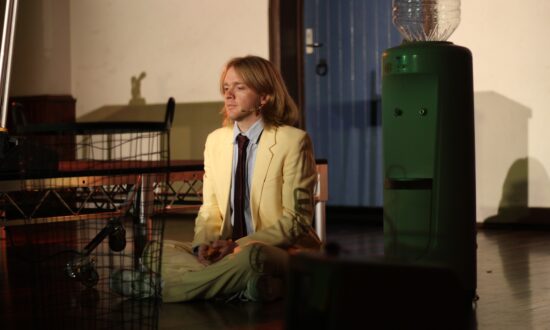UK theatre-making duo Alexander Wright and Phil Clive Grainger have become a staple at Adelaide Fringe since first touring here with the now-acclaimed Orpheus in 2018.
Five years later, they’re still touring Orpheus, and have added The Gods The Gods The Gods and – this year, for the first time – Helios to their Adelaide roster. A cynic might suggest adapting Greek mythology has become little more than a winning formula for the company, but the powerful beating heart of Helios proves the cynics wrong.
This version of the story (as Wright points out early in the show) belongs more to Phaeton, Helios’s son, than to Helios himself. Wright, who wrote the show and performs it, has taken the silhouettes of the original Greek myth and filled them in with the texture of the present day. From the original, we have an absent father whose presence looms large in his son’s consciousness as the son comes of age, and from the modern era we have ’70s pop-rock bangers, a rural village in York, and the thrill of getting your driver’s licence.
The writing, which is assured, accessible and perfectly metered, leaves the audience with no doubt about why Greek myths endure. Under each tale of Gods, mortals, battles and lovers, is a relationship, a power dynamic, or a fatal flaw which is timeless. Wright has mined the Helios-Phaeton relationship to its full potential, adding in plentiful helpings of modern concerns – particularly masculinity’s troubled relationship with vulnerability.
Unfortunately, although Wright chose to include Phaeton’s mother Rhodos in the story, she is the only character who is more set dressing than person. As a result, this Helios is a tale solely of men and boys. It prioritises and isolates their emotional world from that of the woman in the narrative, which feels a little more ancient Greek than 2024.
That being said, Wright’s performance is deeply inclusive. He is generous with his audience in the intimate venue, drawing in each person from the small crowd as he switches between the spoken-word patter of his narrative voice to exposition or stage directions, and slides occasionally into Phaeton’s character. On top of managing the often-grating rhythms of spoken word elegantly, Wright wrangles audience participation in a way that feels somehow non-intimidating.

Get InReview in your inbox – free each Saturday. Local arts and culture – covered.
Thanks for signing up to the InReview newsletter.
The music, composed by Grainger, is an important pacing element. Without the continuous and clever score, the show’s single performer and minimal (read: non-existent) set would ring a little hollow. The music builds emotional crescendos as subtly as Wright’s script does, but it doesn’t have the same inventiveness. By halfway through the show, some of the score’s patterns and phrases already feel a little tired. It is not helped by the pressure heaped upon it by the script’s many and repeated references to classic pop hits, which are – by and large – never heard in the work, presumably because licensing would be a budget nightmare.
These small flaws, though, do not eclipse the whole. Helios is a smart and emotive telling of story that will likely never tire of reinvention.
Helios is at The Yurt at The Courtyard of Curiosities at the Migration Museum until March 17.
Read more 2024 Adelaide Fringe coverage here on InReview.
Support local arts journalism
Your support will help us continue the important work of InReview in publishing free professional journalism that celebrates, interrogates and amplifies arts and culture in South Australia.
Donate Here




